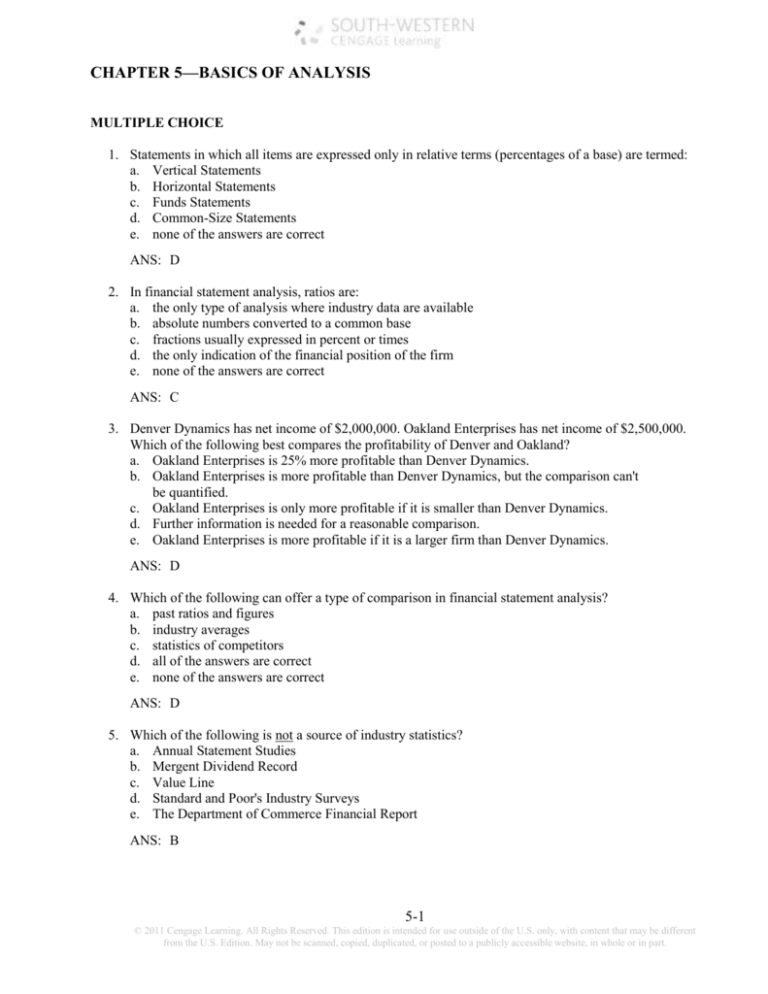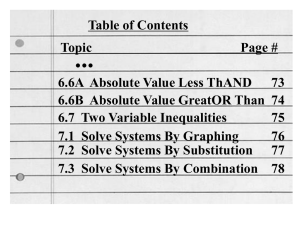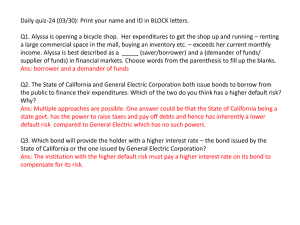
CHAPTER 5—BASICS OF ANALYSIS
MULTIPLE CHOICE
1. Statements in which all items are expressed only in relative terms (percentages of a base) are termed:
a. Vertical Statements
b. Horizontal Statements
c. Funds Statements
d. Common-Size Statements
e. none of the answers are correct
ANS: D
2. In financial statement analysis, ratios are:
a. the only type of analysis where industry data are available
b. absolute numbers converted to a common base
c. fractions usually expressed in percent or times
d. the only indication of the financial position of the firm
e. none of the answers are correct
ANS: C
3. Denver Dynamics has net income of $2,000,000. Oakland Enterprises has net income of $2,500,000.
Which of the following best compares the profitability of Denver and Oakland?
a. Oakland Enterprises is 25% more profitable than Denver Dynamics.
b. Oakland Enterprises is more profitable than Denver Dynamics, but the comparison can't
be quantified.
c. Oakland Enterprises is only more profitable if it is smaller than Denver Dynamics.
d. Further information is needed for a reasonable comparison.
e. Oakland Enterprises is more profitable if it is a larger firm than Denver Dynamics.
ANS: D
4. Which of the following can offer a type of comparison in financial statement analysis?
a. past ratios and figures
b. industry averages
c. statistics of competitors
d. all of the answers are correct
e. none of the answers are correct
ANS: D
5. Which of the following is not a source of industry statistics?
a. Annual Statement Studies
b. Mergent Dividend Record
c. Value Line
d. Standard and Poor's Industry Surveys
e. The Department of Commerce Financial Report
ANS: B
5-1
© 2011 Cengage Learning. All Rights Reserved. This edition is intended for use outside of the U.S. only, with content that may be different
from the U.S. Edition. May not be scanned, copied, duplicated, or posted to a publicly accessible website, in whole or in part.
6. Annual Statement Studies reported the following figures for manufacturers of screw machine products
for the ratio of current assets to current debt. The following figures are for a particular industry's
current ratio: 1.6; 1.3; 1.2. Which best describes these three numbers?
a. One third of each of the companies experienced each of the ratios.
b. The average ratio was 1.3. The best firm had 1.6; The worst had 1.2.
c. The median was 1.3. 1.6 is the figure for the upper quartile; 1.2 is the figure for the lower
quartile.
d. The median was 1.3. 1.6 is the figure for the lower quartile; 1.2 is the figure for the upper
quartile.
e. None of the answers are correct.
ANS: C
7. A manufacturing firm will most likely have the heaviest investment in which type of assets?
a. cash
b. inventory
c. accounts receivable
d. investments
e. plant, property, and equipment
ANS: E
8. A retailing firm has which type of inventory?
a. raw materials
b. work in process
c. merchandise
d. raw materials and merchandise
e. raw materials, work in process, and merchandise
ANS: C
9. Which of the following would not be a user of financial statements?
a. management
b. bankers
c. employee unions
d. investment analysts
e. all of the above are users
ANS: E
10. Which of the following is a government document that provides industry statistics?
a. The Wall Street Journal
b. Business Week
c. Dun's
d. The Department of Commerce Financial Report
e. Standard and Poor's Industry Survey
ANS: D
5-2
© 2011 Cengage Learning. All Rights Reserved. This edition is intended for use outside of the U.S. only, with content that may be different
from the U.S. Edition. May not be scanned, copied, duplicated, or posted to a publicly accessible website, in whole or in part.
11. Suppose you are comparing two firms in the steel industry. One firm is large and the other is small.
Which type of numbers would be most meaningful for statement analysis?
a. Absolute numbers would be most meaningful for both the large and small firm.
b. Absolute numbers would be most meaningful in the large firm; relative numbers would be
most meaningful in the small firm.
c. Relative numbers would be most meaningful for the large firm; absolute numbers would
be most meaningful for the small firm.
d. Relative numbers would be most meaningful for both the large and small firm, especially
for interfirm comparisons.
e. It is not meaningful to compare a large firm with a small firm.
ANS: D
12. Various techniques are used in the analysis of financial data to emphasize the comparative and relative
importance of the data presented and to evaluate the position of the firm. Which of the following is not
one of the techniques used in analysis?
a. ratio analysis
b. common-size analysis
c. theory consistency
d. examination of relative size among firms
e. review of descriptive material
ANS: C
13. Liquidity ratios can be used:
a. to measure the degree of protection of long-term suppliers of funds
b. to measure borrowing capacity
c. to measure the earning ability of a firm
d. to measure the firm's ability to meet its current obligations
e. to measure the worth of the firm
ANS: D
14. Which of these statements is false?
a. A ratio can be computed from any pair of numbers.
b. Given the large quantity of variables included in financial statements, a very long list of
meaningful ratios can be derived.
c. Comparing ratios computed from income statement and balance sheet numbers can create
difficulties due to the timing of the financial statements.
d. Financial ratios are usually expressed in percent or times.
e. In vertical analysis, a figure from the year's statement is compared with a base selected
from the prior statement.
ANS: E
5-3
© 2011 Cengage Learning. All Rights Reserved. This edition is intended for use outside of the U.S. only, with content that may be different
from the U.S. Edition. May not be scanned, copied, duplicated, or posted to a publicly accessible website, in whole or in part.
15. Which of these statements is false?
a. Many companies will not clearly fit into any one industry.
b. A financial service uses its best judgment as to which industry the firm best fits.
c. The analysis of an entity's financial statements can be more meaningful if the results are
compared with industry averages and with results of competitors.
d. When using industry averages, it is often necessary to use an industry that the firm best
fits.
e. A company comparison should not be made with industry averages if the company does
not clearly fit into any one industry.
ANS: E
16. Which of the following does not represent a problem with financial analysis?
a. Financial statement analysis is an art; it requires judgment decisions on the part of the
analyst.
b. Financial analysis can be used to detect apparent liquidity problems.
c. There are as many ratios for financial analysis as there are pairs of figures.
d. Some industry ratio formulas vary from source to source.
e. Adequate detailed disclosure of how the industry ratios are computed is often lacking.
ANS: B
17. Which of the following is a false statement as it relates to analysis?
a. Profitability may not be a major consideration as long as the resources for repayment can
be projected.
b. Equity capital provides creditors with a cushion against loss.
c. There is a difference between the objectives that are sought by short-term grantors of
credit and those sought by long-term grantors of credit.
d. If merchandise with a 20% markup is sold on credit, it would take ten successful sales of
the same amount to make up for one sale not collected.
e. The financial structure of the entity is of interest to creditors.
ANS: D
18. Management is a user of financial analysis. Which of the following comments does not represent a fair
statement as to the management perspective?
a. Management is interested in the view of investors.
b. Management is interested in the view of creditors.
c. Management is interested in the financial structure of the entity.
d. Management is interested in the asset structure of the entity.
e. Management is always interested in maximum profitability.
ANS: E
5-4
© 2011 Cengage Learning. All Rights Reserved. This edition is intended for use outside of the U.S. only, with content that may be different
from the U.S. Edition. May not be scanned, copied, duplicated, or posted to a publicly accessible website, in whole or in part.
19. Which of the following statements is incorrect?
a. The North American Industry Classification System (NAICS) was created jointly by the
United States, Canada, and Mexico.
b. For the NAICS, economic units with similar production processes are classified in the
same industry, and the lines drawn between industries demarcate differences in production
processes.
c. NAICS provides enhanced industry comparability among the three NAFTA trading
partners.
d. NAICS divides the economy into twenty sectors.
e. In most sectors, NAICS provides for compatibility at the industry (six-digit) level.
ANS: E
TRUE/FALSE
1. Liquidity ratios measure the degree of protection of long-term suppliers of funds.
ANS: F
2. A given ratio is always computed the same way, no matter what the source.
ANS: F
3. The ideal way to compare income statement figures, such as sales, to balance sheet figures, such as
receivables, is to use a measure of the average for the balance sheet figures.
ANS: T
4. In vertical common-size analysis, the dollar figure for an account is expressed in terms of that same
account figure for a selected base year.
ANS: F
5. Absolute figures usually have more meaning than ratio comparisons.
ANS: F
6. In order to determine the meaning of a ratio, some kind of comparison, such as an industry average or
trend analysis, is helpful.
ANS: T
7. Different accounting methods can cause some ratios to differ substantially.
ANS: T
8. Dissimilar year ends will have no impact on the results of ratios.
ANS: F
5-5
© 2011 Cengage Learning. All Rights Reserved. This edition is intended for use outside of the U.S. only, with content that may be different
from the U.S. Edition. May not be scanned, copied, duplicated, or posted to a publicly accessible website, in whole or in part.
9. The principal asset of a merchandising firm will usually be accounts receivable.
ANS: F
10. A service firm will usually have a low amount of inventory, consisting primarily of supplies.
ANS: T
11. Typically, the largest expense to a manufacturing firm is cost of goods sold.
ANS: T
12. The descriptive information in annual reports is not useful in statement analysis; only the financial
statements themselves are of value.
ANS: F
13. Based on the terms of the credit and the purpose, the objectives of financial statement analysis by
creditors will vary.
ANS: T
14. Financial statement analysis is a judgmental process.
ANS: T
15. There is a standard list of ratios.
ANS: F
16. Common-size analysis involves expressing comparisons in percentages.
ANS: T
17. Absolute figures and ratios are close to being meaningless unless compared to another figure.
ANS: T
18. When performing year-to-year change analysis, a meaningful percent change cannot be computed
when one number is positive and the other number is negative.
ANS: T
19. For NAICS, each country can add additional detailed industries, provided the additional detail
aggregates to the NAICS level.
ANS: T
5-6
© 2011 Cengage Learning. All Rights Reserved. This edition is intended for use outside of the U.S. only, with content that may be different
from the U.S. Edition. May not be scanned, copied, duplicated, or posted to a publicly accessible website, in whole or in part.
PROBLEMS
1. Comparative income statements for 2010 and 2009 follow.
2010
2009
$9,434,000
7,075,400
$2,358,600
1,367,690
$ 990,910
157,500
$ 833,410
400,000
$ 433,410
Sales
Cost of Sales
Gross Profit
Operating Expenses
Operating Income
Interest Expense
Earnings Before Tax
Income Taxes
Net Income
$7,862,000
5,660,640
$2,201,360
1,365,060
$ 836,300
126,000
$ 710,300
317,200
$ 393,100
Required:
a. Prepare a vertical common-size analysis of this statement for each year, using sales as the
base.
b. Comment briefly on the changes between the two years, based on the vertical common-size
statement.
ANS:
a.
Sales
Cost of Sales
Gross Profit
Operating Expenses
Operating Income
Interest Expense
Earnings Before Tax
Income Taxes
Net Income
2010
2009
100.0%
75.0
25.0
14.5
10.5
1.7
8.8
4.2
4.6%
100.0%
72.0
28.0
17.4
10.6
1.6
9.0
4.0
5.0%
b. Cost of sales as a percent of sales have risen substantially. This increase is nearly offset by a
decline in operating expense. Interest expense and taxes have both risen slightly in relation to
sales.
2. Toledo Toy, a manufacturer of infants’ blocks, presented the following data in its last annual report.
This trend analysis begins with the year of formation, 2007.
Sales
Cost of Sales
Net Income
Cases of Blocks Shipped
2010
2009
2008
2007
$61,000
$41,300
$9,919
33,126
$41,000
$28,175
$6,412
22,681
$25,000
$17,201
$3,850
13,900
$13,000
$9,000
$2,000
7,400
Required:
a. Using 2007 as the base year, perform a horizontal, common-size analysis.
b. Comment on the results of the horizontal analysis.
5-7
© 2011 Cengage Learning. All Rights Reserved. This edition is intended for use outside of the U.S. only, with content that may be different
from the U.S. Edition. May not be scanned, copied, duplicated, or posted to a publicly accessible website, in whole or in part.
ANS:
a.
Sales
Cost of Sales
Net Income
Cases of Blocks Shipped
2010
2009
2008
469.2
458.9
496.0
447.6
315.4
313.1
320.6
306.5
192.3
191.1
192.5
187.8
2007
100.0%
100.0%
100.0%
100.0%
b. Sales have risen rapidly. The cost of sales have risen more slowly than sales. Also, there has
been a much faster rise in net income than in sales. The cases of blocks shipped have
increased more slowly than sales dollars, indicating a rise in selling price or an improved mix
of sales towards more expensive blocks.
3. The following are simplified, vertical, common-size balance sheets for three firms—a retailer, a
service firm, and a manufacturer.
Assets
Firm A
Firm B
Firm C
6.1%
23.2
31.1
60.4
30.3
9.3
100.0%
8.1%
4.4
1.5
14.0
83.4
2.6
100.0%
8.7%
12.1
24.5
45.3
51.8
2.9
100.0%
Total Current Liabilities
29.3%
11.5%
21.6%
Long-Term Debt
18.1
24.8
37.8
52.6
100.0%
63.7
100.0%
40.6
100.0%
Cash
Receivables
Inventory
Total Current Assets
Plant, Property, and Equipment (net)
Investments
Total Assets
Liabilities and Stockholders' Equity
Total Stockholders' Equity
Total Liabilities and Stockholders' Equity
Required: Match the statements to the type of firm and explain your choice.
ANS:
Firm A is the retailing firm, due to the heavy investment in receivables and inventory with limited
fixed assets. The store facilities may be rented.
Firm B is the service firm, due to the limited inventory.
Firm C is the manufacturing firm, due to the combined heavy investment in inventory and fixed assets.
Also, it uses substantial long-term debt.
5-8
© 2011 Cengage Learning. All Rights Reserved. This edition is intended for use outside of the U.S. only, with content that may be different
from the U.S. Edition. May not be scanned, copied, duplicated, or posted to a publicly accessible website, in whole or in part.
4.
a. Listed below are three groupings of financial ratios.
Liquidity
Long-term borrowing ability
Profitability
Required: Briefly describe what each one measures.
b. Listed below are three groups of users of financial
statements.
Suppliers of raw materials
Potential stockholders
Bondholders
Required: For each group, select the type of ratios from part (a) that each group might be most
interested in. Briefly explain your choice.
ANS:
a. Liquidity ratios measure the firm's ability to pay its current obligations.
Long-term borrowing ability measures the degree of protection of long-term suppliers of
funds.
Profitability ratios measure the earning ability of the firm.
b. Suppliers of raw materials would be most interested in liquidity since their goods and related
obligations are primarily short-term.
Potential stockholders would be most interested in the earning ability of the firm since they
share in residual profits.
Bondholders would be most interested in the long-term borrowing capacity since this
measures the risk of default.
5-9
© 2011 Cengage Learning. All Rights Reserved. This edition is intended for use outside of the U.S. only, with content that may be different
from the U.S. Edition. May not be scanned, copied, duplicated, or posted to a publicly accessible website, in whole or in part.









